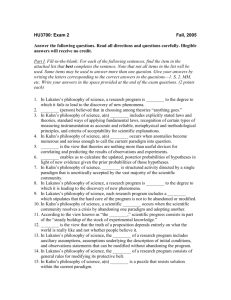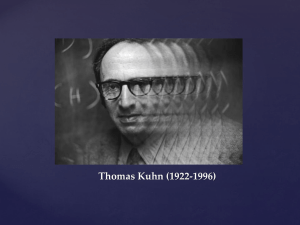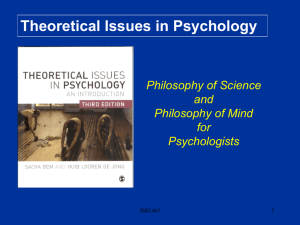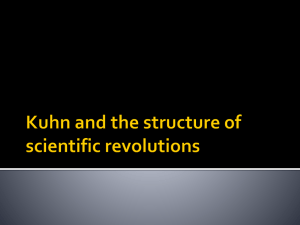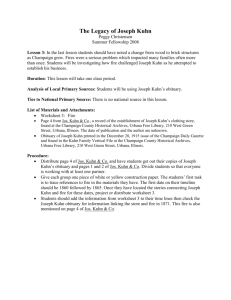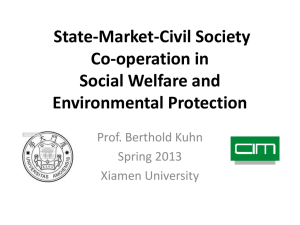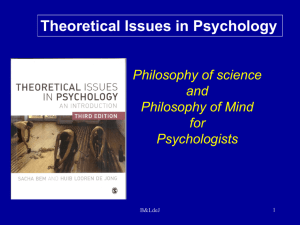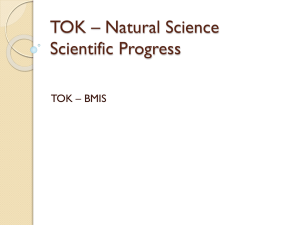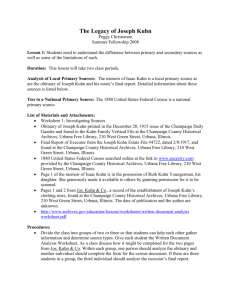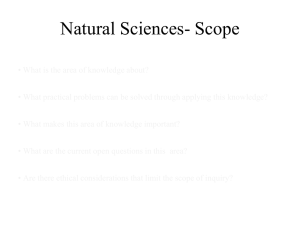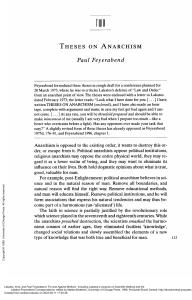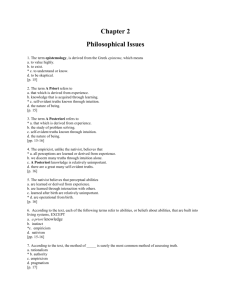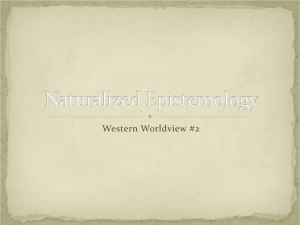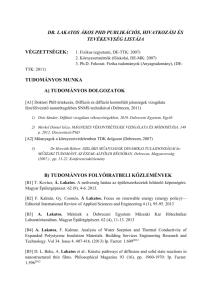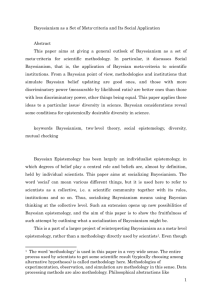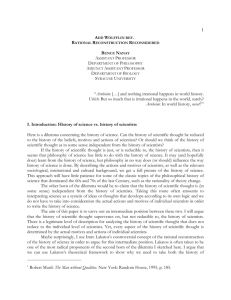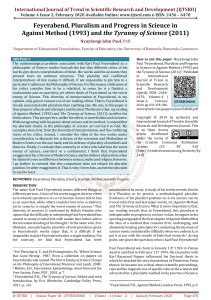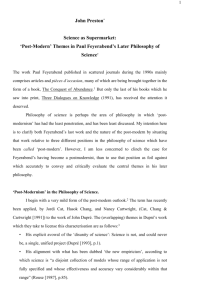pre-science
advertisement
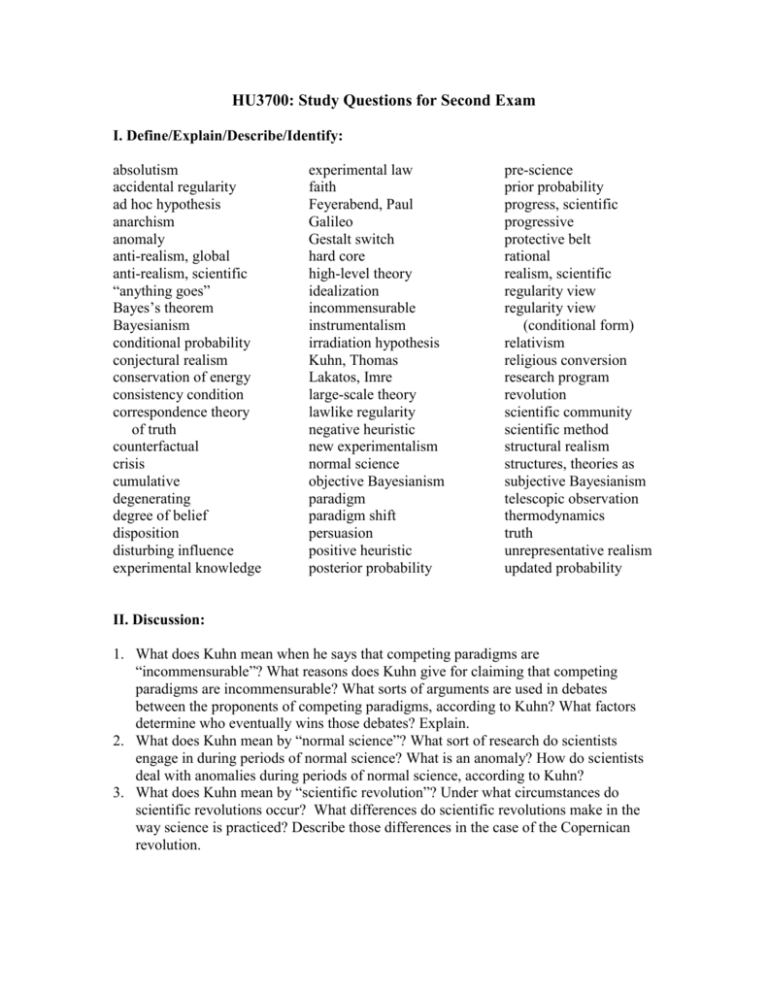
HU3700: Study Questions for Second Exam I. Define/Explain/Describe/Identify: absolutism accidental regularity ad hoc hypothesis anarchism anomaly anti-realism, global anti-realism, scientific “anything goes” Bayes’s theorem Bayesianism conditional probability conjectural realism conservation of energy consistency condition correspondence theory of truth counterfactual crisis cumulative degenerating degree of belief disposition disturbing influence experimental knowledge experimental law faith Feyerabend, Paul Galileo Gestalt switch hard core high-level theory idealization incommensurable instrumentalism irradiation hypothesis Kuhn, Thomas Lakatos, Imre large-scale theory lawlike regularity negative heuristic new experimentalism normal science objective Bayesianism paradigm paradigm shift persuasion positive heuristic posterior probability pre-science prior probability progress, scientific progressive protective belt rational realism, scientific regularity view regularity view (conditional form) relativism religious conversion research program revolution scientific community scientific method structural realism structures, theories as subjective Bayesianism telescopic observation thermodynamics truth unrepresentative realism updated probability II. Discussion: 1. What does Kuhn mean when he says that competing paradigms are “incommensurable”? What reasons does Kuhn give for claiming that competing paradigms are incommensurable? What sorts of arguments are used in debates between the proponents of competing paradigms, according to Kuhn? What factors determine who eventually wins those debates? Explain. 2. What does Kuhn mean by “normal science”? What sort of research do scientists engage in during periods of normal science? What is an anomaly? How do scientists deal with anomalies during periods of normal science, according to Kuhn? 3. What does Kuhn mean by “scientific revolution”? Under what circumstances do scientific revolutions occur? What differences do scientific revolutions make in the way science is practiced? Describe those differences in the case of the Copernican revolution. 4. What does Lakatos mean by “research program” in science? What are the components of such a program? Compare and contrast Lakatos’s notion of a research program with Kuhn’s notion of a paradigm. According to Lakatos, how are research programs evaluated? Under what circumstances do scientists replace one research program with another? 5. Discuss whether Lakatos is an absolutist or a relativist in his views about scientific change. What are his views on scientific progress? What does scientific progress consists of, according to Lakatos? What is the source of tension between his views about evaluating research programs and his views about rationality in science? 6. In what ways is Feyerabend’s philosophy of science “anarchistic”? On what grounds does Feyerabend argue that there is no universal scientific method? Why does Feyerabend devote so much attention to Galileo and his role in the Copernican revolution? What specifically are Chalmers’s objections to Feyerabend’s analysis of Galileo’s role? 7. What essentially is the Bayesian approach to the philosophy of science? What role does Bayes’s theorem play in that approach? What are the main differences between objective and subjective Bayesianism? 8. What specific problems in the philosophy of science is subjective Bayesianism intended to solve? Explain how it solves them. Be specific. Describe and explain 3 objections to subjective Bayesianism? 9. What precisely is “the new experimentalism”? In what ways is it a departure from other approaches in the philosophy of science? What are its claims about the nature of progress in science? About the respective roles of experiment and theory in science? About the theory-dependence of experimental results? 10. What is the regularity view of scientific laws? What is the conditional form of the regularity view? How exactly do the 2 views differ? What are the pros and cons of each view? 11. What is meant by “laws as characterizations of powers and dispositions”? How does that view differ from the two forms of the regularity view of scientific laws? What are its main pros and cons? 12. What are the main considerations in favor of scientific realism? What are the main considerations in favor of scientific anti-realism? What sorts of support do proponents of each view claim to receive from the history of science?
